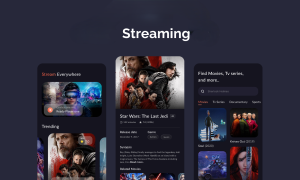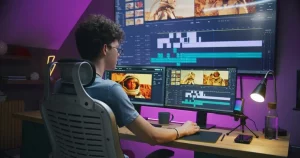Introduction
The way we enjoy entertainment is changing fast, thanks to streaming services and Artificial Intelligence (AI). From watching movies at home to how TV shows are made, AI is now a big part of it. Streaming platforms, like Netflix and Disney+, have changed how we watch shows. AI is changing not just how we watch content but also how it is created and shared. In this article, we will look at how Streaming AI Entertainment is shaping the future of entertainment.
Streaming and AI: How They Work Together

Streaming services have made it easy to watch movies, TV shows, and more whenever we want. With these services, AI plays a key role in improving our experience. AI helps streaming platforms recommend shows and movies based on what we like. For example, if you watch a lot of action movies, AI will suggest more action-packed films that you’ll likely enjoy.
But AI isn’t just for recommendations. It is also used to make streaming better. For example, AI can help adjust video quality depending on your internet speed. This means smoother streaming with fewer interruptions. AI is also being used in creating content like movies, from scriptwriting to video editing, helping creators make content faster and more cost-effectively.
AI and Better Sound Quality
AI is improving sound quality in entertainment. It can remove background noise, balance audio levels, and make dialogue clearer. This is especially useful in podcasts, streaming shows, and live broadcasts. With AI, even old recordings can be enhanced to sound better. It also helps create immersive audio experiences for viewers by adapting the sound based on the type of content, like adjusting music for action scenes or softening tones for emotional moments.
AI in Gaming Graphics
AI is making video game graphics more realistic. It can create detailed environments, lifelike characters, and smoother animations. For example, AI can fill in tiny details, like shadows or reflections, making games look more natural. It also helps games load faster by optimizing graphics without losing quality. Players can enjoy stunning visuals without lag, making gaming more enjoyable and immersive.
AI and Predicting Trends
AI helps entertainment companies predict what will be popular. By studying what people watch, listen to, or play, AI can spot patterns and trends. This information helps creators decide what type of content to make next. For example, if a lot of people are watching superhero movies, studios might invest in similar projects. This ensures that content stays relevant and matches what audiences want.
AI and Educational Content
AI is also improving educational content in entertainment. It helps create interactive learning experiences, like games or videos that teach new skills. For example, AI-powered apps can recommend lessons based on what you’ve already learned. This makes it easier for people to learn at their own pace while having fun. By combining education and entertainment, AI is making learning more engaging for all ages.
AI in Content Recommendations

One of the most well-known ways AI is used in streaming is through content recommendations. Streaming platforms like Netflix and Amazon Prime Video use AI to suggest what you should watch next. These suggestions are based on your past viewing habits, like the genres you prefer or how long you typically watch. With AI, streaming services can show you content that you are likely to enjoy without having to search through long lists of shows and movies.
The more you watch, the smarter the recommendations become. AI learns from your habits and gets better over time. This keeps you entertained and engaged, making it easier to discover new content that suits your taste.AI in Improving Video Quality
AI is making videos look better. It can take old or blurry footage and sharpen the details, making it clear and smooth. Streaming services use AI to adjust video quality based on your internet speed, so the video doesn’t pause or lag. This means you can enjoy movies and shows without interruptions, even if your connection isn’t fast.
AI in Saving Time for Creators
AI tools are helping creators save time. For example, they can automatically edit videos, add captions, or create music tracks. These tasks used to take hours, but now AI can finish them quickly. This gives creators more time to focus on their ideas and creativity. Small creators especially benefit because AI makes it easier for them to produce high-quality content.
AI and Interactive Content
AI is making entertainment more interactive. For example, some streaming platforms let viewers choose what happens next in a story. This is possible because AI can adjust the plot based on the viewer’s choice. Games and shows with interactive elements are becoming more popular because they make the audience feel like part of the story.
AI in Reducing Costs
AI is helping entertainment companies save money. For instance, instead of hiring a large team for certain tasks, AI can handle them efficiently. This includes tasks like editing, animation, or even translating content. By reducing costs, companies can invest in creating more content or improving quality, benefiting both the creators and the audience.
AI and Real-Time Feedback
AI provides instant feedback to creators. If a show or movie isn’t doing well, AI can analyze the data and suggest changes. For example, if viewers stop watching a series halfway, AI might recommend shortening episodes or adjusting the story. This helps creators make better decisions and improve content quickly, keeping audiences interested.
AI and Personalized Ads
AI is making advertisements less annoying and more useful. It studies what viewers like and shows ads that match their interests. For example, if you watch cooking shows, you might see ads for kitchen gadgets. This makes ads feel more relevant and less intrusive. Companies benefit too, as personalized ads are more likely to grab attention and drive sales.
AI in Content Creation and Production

AI is not only changing how we watch content, but also how it is created. In the past, making movies or TV shows took a lot of time and effort. But with AI, many parts of the process are faster and cheaper. For example, AI can help with writing scripts, making digital characters, and editing videos. This allows creators to focus on the creative side of their work while AI handles more technical tasks.
AI can also analyze popular movies and TV shows to understand what works. It can look at storylines, genres, and characters that viewers like. This information helps creators make better decisions about what type of content to produce, ensuring it has a good chance of success.
AI for a Better Viewing Experience
AI is also improving the way we experience entertainment. It is used to make sure that videos play smoothly, even if your internet connection isn’t perfect. For example, AI can adjust the video’s resolution to match your connection speed. If you have a slower internet connection, the video might play in a lower resolution to avoid buffering, and then switch back to HD when the connection improves.
In addition, AI is making entertainment more interactive. Virtual reality (VR) and augmented reality (AR) are becoming more common in entertainment, and AI helps power these technologies. VR and AR allow you to interact with shows and movies in a new way, like exploring virtual worlds or choosing different endings for a story.
AI in Movie Recommendations
AI is great at suggesting movies to watch. It looks at what you’ve already seen and liked, then finds similar titles. For example, if you enjoy action movies, AI will recommend other action-packed films. This saves time and helps people find new favorites. The more you use streaming services, the better AI gets at understanding your taste, making movie nights easier and more fun.
AI in Creating Special Effects
Special effects in movies have improved a lot because of AI. Tasks that used to take hours or even days can now be done faster. For instance, AI can create realistic explosions, futuristic landscapes, or even lifelike digital characters. This allows filmmakers to focus on storytelling instead of spending too much time on technical details. AI helps make movies more visually stunning and keeps costs lower, making it easier to produce high-quality films.
AI in Marketing and Advertising

AI is also changing how entertainment is marketed. Streaming platforms use AI to analyze data about viewers, like their age, location, and watching habits. This helps create ads that are more relevant to each person. For example, if you watch a lot of action movies, you might see ads for new action films, while someone who enjoys drama might see different ads.
AI helps optimize marketing by predicting which shows will be popular. This way, streaming services can plan their releases better, reaching the right audience at the right time. It also helps increase subscriber numbers and keep viewers interested in new content.
Challenges of AI in Entertainment
While AI is making big improvements to streaming, there are some challenges to consider. One concern is privacy. Streaming services collect a lot of data to personalize recommendations, and this data needs to be protected. People may be worried about how their information is being used, especially with AI systems that learn from personal viewing habits.
Another issue is job displacement. As AI becomes more capable of handling tasks like content creation, some jobs in the entertainment industry may be automated. This could mean fewer traditional roles in production, with more focus on AI management.
Lastly, AI can sometimes reinforce biases. Since AI systems are trained on past data, they can end up promoting content that reflects existing stereotypes. It’s important for developers to ensure AI systems are fair and diverse, so they don’t leave out important voices or perspectives.
The Future of Streaming and AI

The future of streaming is likely to see even more ways AI can make entertainment better. As Streaming AI Entertainment technology improves, we may see more personalized content, where shows and movies can change based on your preferences. Imagine a movie that can adapt its storyline depending on the choices you make, or a TV show that interacts with you.
AI will also help smaller creators and companies compete with the big streaming giants. Tools that help with video editing, scriptwriting, and marketing could make it easier for independent filmmakers to reach audiences. This democratization of content creation could lead to a more diverse range of entertainment.
Looking Ahead
As AI continues to evolve, it will play an even bigger role in entertainment. It will make content creation faster, cheaper, and more personalized. Streaming platforms will use AI to improve user experience, offer tailored content, and predict what shows will be hits. The future of entertainment is exciting, with AI paving the way for new and better ways to enjoy content.
A Comparative Look at Traditional vs. AI-Driven Entertainment
| Aspect | Traditional Entertainment | AI-Powered Entertainment |
|---|---|---|
| Content Discovery | Manual searching and browsing | Personalized AI recommendations |
| Content Creation | Human-driven (writing, filming) | AI-assisted (editing, scriptwriting) |
| Viewer Engagement | Passive viewing | Interactive, immersive experiences (VR, AR) |
| Advertising | Generic ads | Targeted ads based on user preferences |
| Production Time | Time-consuming and expensive | Faster, more efficient with AI tools |
Conclusion
In conclusion, AI is reshaping the entertainment industry in many ways. From personalized recommendations to faster content production, AI is making streaming services better and more engaging. While there are challenges, like privacy concerns and job changes, the future of entertainment looks bright. As AI technology advances, we can expect even more exciting and personalized experiences for viewers, making streaming a central part of our entertainment lives.










